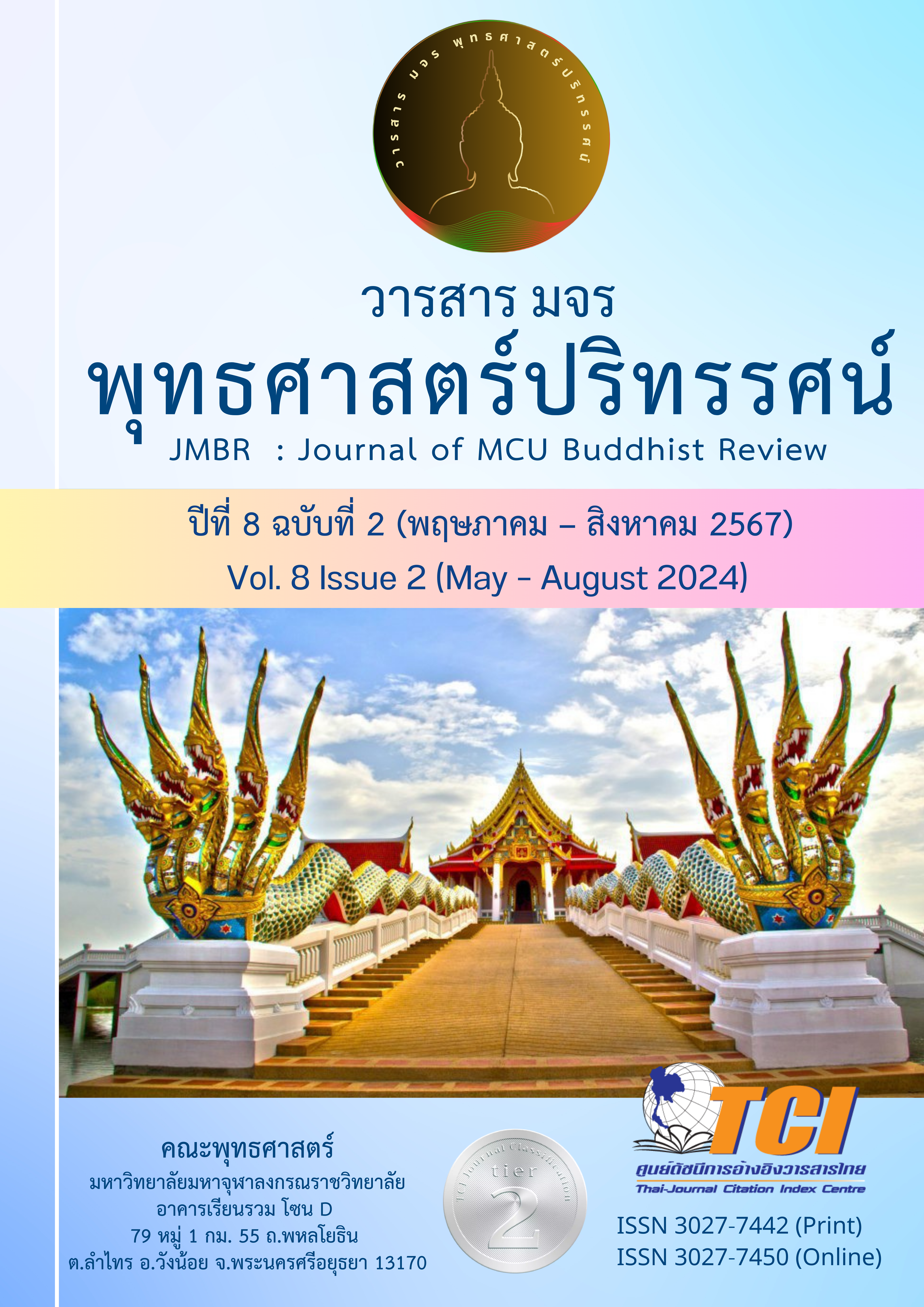การศึกษาวิเคราะห์พละ 4 ในพลสูตร
Main Article Content
บทคัดย่อ
บทความวิจัยนี้มีวัตถุประสงค์ 1) เพื่อศึกษาโครงสร้างและสาระสำคัญของพลสูตรต่าง ๆ ในพระไตรปิฎก 2) เพื่อศึกษาหลักคำสอนเรื่องพละ 4 ในพลสูตร 3) เพื่อวิเคราะห์หลักคำสอนเรื่องพละ 4 ในพลสูตร ใช้ระเบียบวิธีวิจัยเชิงเอกสาร วิเคราะห์ข้อมูลเชิงเนื้อหา นำเสนอเชิงพรรณนาวิเคราะห์
ผลการวิจัยพบว่า 1) หลักธรรมในหมวดพลธรรมนั้น มีปรากฏอยู่ในพระสูตรหลายแห่งด้วยกัน จะมีความหมายเหมือนกันคือ เป็นหลักปฏิบัติที่ทำให้ผู้ปฏิบัติเกิดกำลัง เกิดพลัง เพื่อทำให้ผู้ปฏิบัติสามารถก้าวขึ้นไปสู่ความสำเร็จได้ตามเป้าหมายที่ผู้ปฏิบัติตั้งเป้าเอาไว้ ซึ่งมีทั้ง พละ 4 ,พละ 5 , พละ 6 และพละ 7 ประการ 2) พลธรรมที่มีในพระไตรปิฎกนั้น หากแต่จะแตกต่างกันตามวัตถุประสงค์และเป้าหมายการนำไปใช้ ก็จะนำบางหัวข้อเข้าไปประกอบรวมกันเป็นพลธรรมในพระสูตรเหล่านั้น ในทางพุทธศาสนาปัญญาที่สร้างประโยชน์ในปัจจุบันชาติ รวมถึงใช้ในการปฏิบัติธรรมชำระจิตใจให้บริสุทธิ์ เพื่อประโยชน์ในภพชาติต่อไปจนถึงภพชาติสุดท้ายคือเข้าพระนิพพาน ส่วนวิริยะ คือความเพียรเพื่อความสุข ความสำเร็จ การพยายามฝึกจิตให้เป็นสมาธิในทุกอิริยาบถ ส่วนของอนวัชชะ หน้าที่การงานและความประพฤติที่ไม่มีโทษมีความสุจริต และส่วนสังคหะ การช่วยเหลือเกื้อกูล เพื่อแก้ปัญหาพื้นฐานของชีวิตในด้านปัจจัย 4 เพื่อให้ผู้รับสามารถพึ่งพาตนเองได้ สร้างสังคมแห่งความสุข และการแก้ปัญหาที่แท้จริง คือ ความทุกข์ในจิตใจ เพราะจะเกิดพลังที่เสมือนภูมิต้านทานสิ่งที่จะเป็นภัยอันตรายจากการดำเนินชีวิต คือ ภัยจากการครองชีพ ภัยจากการเสื่อมเสียชื่อเสียง ภัยจากความครั่นคร้ามเก้อเขินในที่ชุมชน ภัยจากความตาย และภัยจากทุคติภูมิ 3) การประยุกต์ใช้หลักพละ 4 ในการเพิ่มสมรรถนะให้กับผู้ปฏิบัติงาน คือ การบูรณาการหลักธรรมที่นำมาเสริมสร้างสมรรถนะให้กับผู้ปฏิบัติงานหรือบุคลากรเพื่อประยุกต์ใช้โดยการนำหลักพละ 4 และหลักสังคหพละกับหลักสมรรถนะตามหลักสากล คือ ความรู้ ทักษะ และความสามารถ หากบุคคลมีลักษณะในด้านบวกเฉพาะตนได้บูรณาการหลักธรรมมาประยุกต์ในการทำงานจะทำให้บุคคลนั้นเป็นผู้มีความรู้คู่คุณธรรมแล้ว ย่อมนำองค์กรไปสู่เป้าหมายอย่างแน่นอน
Article Details

อนุญาตภายใต้เงื่อนไข Creative Commons Attribution-NonCommercial-NoDerivatives 4.0 International License.
- บทความที่ได้รับการตีพิมพ์เป็นลิขสิทธิ์ของวารสาร มจร พุทธศาสตร์ปริทรรศน์
- ข้อความใดๆ ที่ปรากฎในบทความที่ได้รับการตีพิมพ์ในวารสาร ถือเป็นความรับผิดชอบของผู้เขียนบทความ และข้อคิดเห็นนั้นไม่ถือว่าเป็นทัศนะและความรับผิดชอบของกองบรรณาธิการวารสาร มจร พุทธศาสตร์ปริทรรศน์
เอกสารอ้างอิง
จรัส พยัคฆราชศักดิ์. (2544). พระพุทธศาสนา. กรุงเทพฯ: วัฒนาพานิช.
ชญณา ศิริภิรมย์. (2566). หลักพละ 4 : สำหรับการพัฒนาสมรรถนะของบุคลากรในองค์กร. วารสารพุทธนวัตกรรมและการจัดการ. 6(2), 1-11.
บุญเกียรติ โชควัฒนา. (2554). หลักคิดและปรัชญาในการทำงาน. กรุงเทพฯ: ฝ่ายโรง พิมพ์บริษัทเอมี่ เอ็นเตอร์ไพรส์ จำกัด.
พระครูโสภณวีรานุวัตร(นิคม ณฏฺฐวโร)และคณะ. (2566). การพัฒนาสมรรถนะการปฏิบัติงานตามหลักพละ 4 ของบุคลากรองค์การบริหารส่วนตำบลพลับพลาไชย อำเภออู่ทอง จังหวัดสุพรรณบุรี. วารสารสันติศึกษาปริทรรศน์ มจร. 6(4), 15-28.
พระเทพวัชรเมธี(สมคิด จินฺตามโย)และคณะ. (2563). แนวทางการประยุกต์ใช้หลักพละ 5 เพื่อพัฒนาชุมชนบ้านศาลาดินอำเภอพุทธมณฑล จังหวัดนครปฐม. รายงานวิจัย. นครปฐม: มหามกุฏราชวิทยาลัย.
พระธรรมกิตติวงศ์ (ทองดี สุรเตโช). (2548). ภาษาธรรม. กรุงเทพฯ: สำนักพิมพ์เลี่ยงเชียง.
พระธรรมโกศาจารย์ (ประยูร ธมฺมจิตฺโต). (2549). พุทธวิธีการบริหาร. กรุงเทพฯ: มหาจุฬาลงกรณราชวิทยาลัย.
พระธรรมปิฎก (ป.อ.ปยุตฺโต). (2538) พจนานุกรมพุทธศาสน์ ฉบับประมวลศัพท์. กรุงเทพฯ: มหาวิทยาลัยมหาจุฬาลงกรณราชวิทยาลัย.
พุทธทาสภิกขุ. (2548). ธรรมะกับการเมือง. กรุงเทพฯ: สำนักพิมพ์เพชรประกาย.
มหาจุฬาลงกรณราชวิทยาลัย. (2539). พระไตรปิฎกภาษาไทย ฉบับมหาจุฬาลงกรณราชวิทยาลัย. กรุงเทพฯ: มหาวิทยาลัยมหาจุฬาลงกรณราชวิทยาลัย.
วีรณัฐ โรจนประภา. (2559). การนำหลักพุทธธรรรมมาประยุกต์ใช้ในการสร้างสังคมแห่งสัมมาปัญญาในประเทศไทย. วารสารบัณฑิตวิทยาลัย มหาวิทยาลัยสวนดุสิต. 12(3), 217-231.


